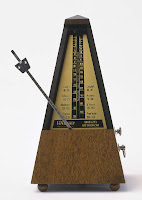Technical progress is a shape-shifting thing. It often comes in stages. First, I can’t do it at all. Then I begin work, barely knowing exactly what I’m doing, but trying things I’ve been told by others. If I’m lucky, there comes a brief flash when I almost do it—of course it flits away immediately, but now I’ve the tiniest window into the correct feel of what I’m trying to do. That encourages me, and I soldier on. Next, I get to where I can do it, but not consistently, and certainly not in front of an audience. Again, I soldier on. In time and with a lot of hard work, I have in hand something that moves me forward as a player.
None of these stages are clearly discrete from one another. In fact, there’s seldom an “eureka” moment when I obviously cross from can’t to can. Rather, it’s more like one day I stop and say: “Wait a minute, didn’t this used to be impossible for me?”
As I run repetitions above 80, I’m more and more trying to simulate a performance mindset. Rather than endlessly running repetitions one after the other, I’m treating each repetition as an individual performance. I’m trying to recreate the “one and done” reality of guitar playing. A technique that crumbles under pressure is worthless. So it’s time to ratchet up the pressure.
I’ve also begun adding a modest collection of right hand studies at the end of each session. Brouwer’s Nos. 6 and 7 from Estudios Sencillos make an appearance, 6 for arpeggios, and 7 for string crossing. (I also like 7 for its weirdness—it sounds like music from another planet.) A couple of Giuliani studies are in there, and also Carcassi’s Op. 60 No. 7. And sometimes I top it off with Villa-Lobos Etude 1 and the Carulli Fandango.
I’d like to close with a defense of the much maligned metronome. From time to time during my project I’ve been advised to ditch the metronome. I find such advice odd, particularly coming from musicians, and especially coming from guitarists. There often appears a fundamental misunderstanding of what the real value of a metronome is for a practicing musician.
First, I’d like to dispense with an argument I’ve seen repeatedly. It’s illustrated by the following exchange, where I wrote:
“Really, there’s no fundamental difference between keeping up with an orchestra and keeping up with a metronome.”...which prompted this reply:
“There is a fundamental difference, otherwise we would be happy with computers playing everything without those annoying mistakes humans make in live performances. The metronome may have a pulse but it doesn’t breathe.”Try as I might, I can’t understand why someone thinks any musician needs to be told this. Yes, the metronome is inflexible. That’s not a secret—everyone who uses a metronome knows it. To tell a musician that a metronome is inflexible is tantamount to saying that you’re talking to an idiot who can’t tell the difference between a tempo set by a living orchestra and a tempo tapped out by a machine. That may be so. But isn’t it more charitable to assume that the musician you’re talking to perhaps has something less idiotic in mind?
Which brings me to my main defense of the metronome. I don’t see the metronome as something that teaches me how to keep a steady tempo. It may, but that’s not its real value. Its real value is that it trains me to be objective about my playing. Rather than relying on my internal and subjective sense of tempo, the metronome forces me to attend to something outside myself. I must match my playing to something that cares not a whit for my problems in executing a particular passage or technique. Either I can do it, or I can’t. The metronome immediately tells me. There’s no negotiating, begging, or wheedling with it. And that’s what I mean when I say there’s no fundamental difference between keeping up with an orchestra and keeping up with a metronome.
Speaking of the metronome, I once attended a performance of György Ligeti’s Poème Symphonique. For those unfamiliar with it, this is a piece in which 100 wind-up metronomes are set a-going. The piece ends when the last metronome stops. While I might quibble with its definition as a musical work, I must admit it was an oddly mesmeric spectacle. I also recall that some in the audience were taking bets on which metronome would be the last to run down. In my opinion, Ligeti missed a potentially lucrative opportunity to exploit this aspect of his composition.
——[My next update will be February 26, 2012]——


No comments:
Post a Comment